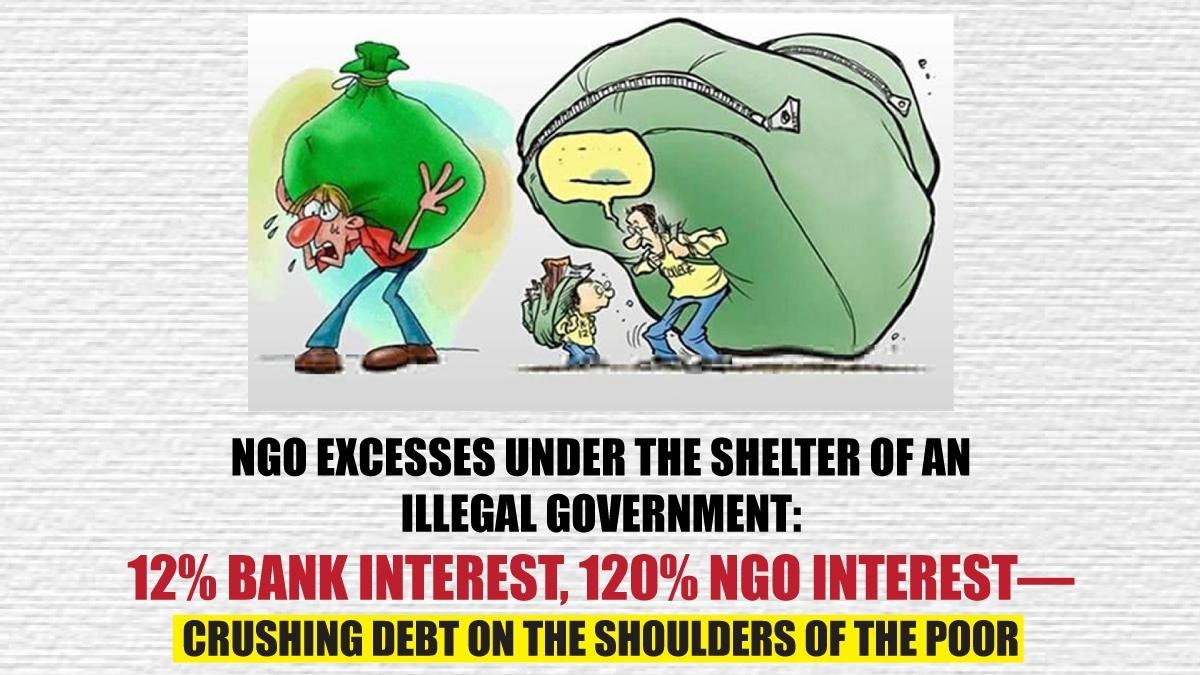In the northern districts of Rajshahi, Chapainawabganj, and Natore, at least ten people have taken their own lives in the past three months under the unbearable pressure of NGO loans. Families and locals allege that NGO workers surrounded their homes daily, harassing them to collect installments and creating unbearable psychological pressure. With dwindling farm income, loss of daily labor opportunities, or business failure, many debtors were unable to repay and chose the most extreme escape—suicide.
The Trap of NGO Loans
While banks charge a maximum of 12% interest, NGOs are extracting rates as high as 120%.
Nuruzzaman, a farmer from Godagari in Rajshahi, said:
“At first, I thought an NGO loan would help me cultivate my land. But to pay one installment, I had to take another loan. In the end, I even sold my cattle.”
A woman from Chapainawabganj Sadar shared:
“When I couldn’t repay, they came every day and humiliated me. Constant fights with my husband, unrest at home—life became unbearable.”
Government’s Role in Question
Many now refer to the advisory council of the “illegal Yunus government” as the “NGO Council.” Local political activists accuse the government of promoting NGO business expansion by restricting banks and cooperatives, allowing NGO branches to spread in villages across the country.
Economist Professor Anwar Hossain said:
“The rural economy needs cheap loans to survive. Instead, NGO lending has become a system that reproduces poverty. The government should have regulated this—but it is encouraging it instead.”
A Wave of Suicides
In the past three months alone, at least ten people in Puthia (Rajshahi), Shibganj (Chapainawabganj), and Singra (Natore) have died by suicide. Local officials admit financial stress played a role—but NGOs have not been formally held accountable.
Rafiqul Islam, president of the social organization Grameen Manabadhikar Parishad, said:
“Every day we receive new complaints. The loan sharking of NGOs has spread like drugs. It is creating not only economic but also social disaster.”
Experts argue:
Legal caps must be imposed on NGO interest rates.
State bank branches must expand into rural areas.
Low-interest loans should be launched for farmers and small entrepreneurs.
A dedicated complaint cell is needed for victims of NGO harassment.
Until such steps are taken, NGO loans will not be a path of liberation for the poor—but a trap of poverty and despair spreading across rural life.
IPO frozen, investment dead: Share market turns into a graveyard under an illegal government
Bangladesh’s capital market is now in dire crisis. For more than a year, no new company has received approval for an Initial Public Offering (IPO). As a result, industrial financing from the market has been blocked for an extended period. Business expansion has stalled, and small investors are suffering repeated losses.
The Investors’ Losses
According to recent DSE data, from mid-2024 to mid-2025, market capitalization has dropped by nearly Tk 850 billion. Around 3 million small investors have been affected—many of them had broken savings certificates or taken bank loans to enter the market. Today, they stand on the brink of ruin.
A retail investor lamented:
“Under this illegal government, no one can trust the share market. Investing here only guarantees loss.”
IPO Stagnation and Abuse
In recent years, many companies that raised funds through IPOs diverted the money into unrelated ventures instead of expanding their businesses. Some enriched themselves without boosting profits. Weakness and negligence in the regulatory approval process have worsened the crisis.
[NGO excesses under the shelter of an illegal government: 12% bank interest, 120% NGO interest—crushing debt on the shoulders of the poor]
Analysts argue: IPO approvals were granted based on paper gimmicks without safeguarding investors’ money. This is a clear failure of the government—and a product of its illegitimate influence.
Responsibility of the Illegal Government
The incompetence, policy bankruptcy, and negligence of the interim illegal government have paralyzed the capital market. Businesspeople now refuse to invest, as every decision of the government is riddled with uncertainty and disorder.
One leading market analyst expressed anger:
“As long as this illegal government remains in power, no businessperson will risk new investments. Investor confidence will only sink deeper.”
A Negative Signal for the Economy
With the capital market frozen, no new jobs are being created in industries, and production growth is being stunted. The billions lost by investors are weakening the national economy.
Because of the failure and incapacity of this illegal government, the country’s economy now stands at the brink of collapse. The erosion of confidence in the capital market is not only a disaster for investors—it is a dire omen for the nation’s future.





